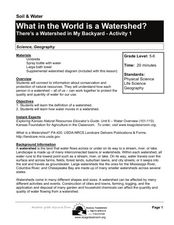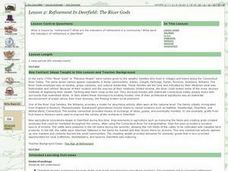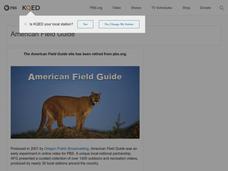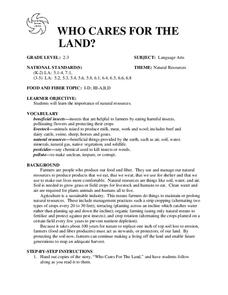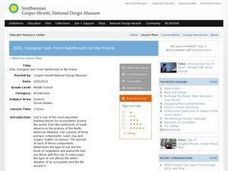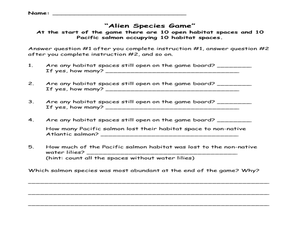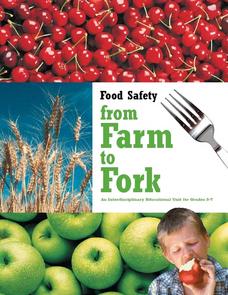Curated OER
What in the World Is a Watershed?
Students discover the role of a watershed. In this geography lesson, students are shown a diagram of a watershed and discuss the definition of a watershed. Students demonstrate the role of a watershed by using an umbrella and spraying it...
Curated OER
An Egg is Quiet
Students discover information about animal eggs by reading the book, An Egg is Quiet. In this animal science lesson, students research different animals to find out what their eggs look like. Students use a provided chart to guide...
Curated OER
Refinement in Deerfield: The River Gods
Young scholars research the town of Deerfield, CT and its River God families to show how the middle class developed in the Connecticut River Valley.
Curated OER
Seventh Grade Social Studies Test
In this Georgia social studies assessment worksheet, 7th graders respond to 30 multiple choice questions based on 7th grade social studies skills.
Curated OER
An Ancient Revolution: The Written Word
Young scholars examine the Bible, one of the earliest written sources, as a compilation of narratives, and search the resources on the HERITAGE DVD-ROM for historical "proof" as well as create their own stories and scripts based on...
Curated OER
Picture Perfect Pyramid
Students investigate the concept of the food pyramid. The instructional activity includes background information for the teacher to lecture students about the food pyramid. They construct a model of the pyramid using cereal boxes. The...
Curated OER
Flowers and Plants
Students are assigned to bring five flowers. They explore flowers to distinguish different physical features of flowers. They compare and contrast different flowers to determine what features they have in common. Students develop an...
Curated OER
WHO CARES FOR THE LAND?
Students explore the importance of natural resources. They are given copies of the story, "Who Cares For The Land," and students follow
along as the teacher reads it. Students identify the key points in the story. (Soil, water and air...
Curated OER
EGG MAZE: COUNTING BY TWOS, THREES AND FIVES
Students successfully count by twos, threes and fives, using pictures of eggs and poultry as points of interest. They orally review the types of counting (twos, threes, or fives). Students are introduced the idea of a dozen eggs.
Curated OER
Pollinator Habitats
Students read and discuss background information included with this lesson plan. They brainstorm the best sources for developing a list of native or migratory pollinators. Students work in groups to design habitats based on information...
Curated OER
Soil, Designer Soil: From Rainforests to the Prairie
Students explore the role and importance of soil in the ecosystem. In this Science and Social Studies lesson plan, students complete an experiment using various kinds of soil and clay and then examine how soil has a direct impact on our...
Curated OER
What is the history of rice in the United States?
Fifth graders become familiar with the history of rice and create a board game. In this rice lesson, 5th graders understand the history of rice through the playing of a game. Students use vocabulary words related to the history of rice.
Curated OER
Salmon and the Non-Native Species
Students investigate the affect of non-native species on Pacific Salmon. In this non-native species and Pacific Salmon lesson, students participate in a competition and habitat loss game. They play the game in groups, while answering...
Curated OER
Mangrove Loss Faster than Land-Based Forests
Students explore the reasons Mangrove forests are in jeopardy. In this activity, students read an article that discusses specific facts on Mangrove forests, then complete numerous activities that reinforce the information, such as...
Curated OER
Recycle, Reduce, Reuse and Save a Tree
Students examine how to save and protect trees. In this conservation lesson, students read books about the usefulness of trees, write ideas in their journals about how trees can be used, and make a book of ways to protect trees.
Curated OER
Sticks, Stones, Sinews and Stuff: How Early People Used the Environment to Meet Basic Needs
Students create an artifact. For this early survival lesson, students use found objects to create an artifact that could have been used to help early people meet their basic needs.
Curated OER
VA History Mini-quiz - Women and Africans arrive in Jamestown
In this Virginia history worksheet, students examine their knowledge of Jamestown once women and Africans arrived there as they answer 13 multiple choice questions.
Curated OER
Fish In a Bottle
Learners work together to build their own fish ecosystems. As a class, they share their prior knowledge about catfish and use a diagram to label its body parts. They record their observations of the ecosystem and determine what they...
Curated OER
Land Leases
In this environment worksheet, students look for the answers to a problem. They read the article and then work in teams to analyze and make an informed decision.
Curated OER
Why Are People Hungry?
Pupils discuss why many people don't have a balanced diet with nutritious food in order to not be hungry. In this hungry lesson plan, students learn what it means to eat healthy and start a service project for their community to help...
Curated OER
Crops 2: What Plants Need to Grow
Students explore the kinds of things that plants need to grow well.
Curated OER
Are You Thirsty? The Effects of Pollution on Drinking Water
Discuss the availability of clean, plentiful water and the causes of water pollution. In groups, sixth graders discuss problem-solving methods for keeping water clean. They explore the function of water treatment plants and perform...
Curated OER
Food Safety From Food To Fork
Pupils are introduced to the concept of food safety. In groups, they distinguish between fact and opinion and cause and effect while participating in a board game. They write an essay about what knowledge they gained and review the...


